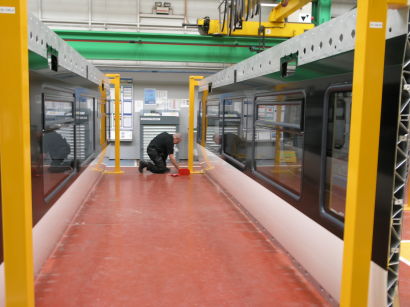BOMBARDIER is reported to be set to review its activities in Britain, after losing a £1.5 billion train order to Siemens.
More than three thousand jobs now hang in the balance, while Bombardier seeks a 'debriefing' from the DfT on why it lost the order for some 1,200 new vehicles for Thameslink.
The order, for which Siemens is now the Department for Transport’s preferred bidder, is to build approximately 300 4-car units to replace and enlarge the present Thameslink fleet. Some of these units would run in 12-car formations, and platforms have already been lengthened accordingly at many stations on the Thameslink and Great Northern routes in recent years.
Assuming that the contract is confirmed later this year, the first of the new trains – built in Germany – are due to be delivered in 2015.
The British supply chain will make some contribution, with up to 300 jobs expected to be created at Hebburn in Tyneside to make components for the new fleet, which Siemens has dubbed 'Desiro City'.
Siemens said that in all 2,000 jobs could be created in Britain as a result of the order, but as there are now fears for the future of the Bombardier train-building works at Derby, more than twice this number could be lost in the East Midlands alone.
Around 2,300 permanent staff are employed by Bombardier at Litchurch Lane in Derby, with another 700 currently on short-term agency contracts.
Several thousand more people are employed by companies in the local supply chain in and around the city, some of whom depend on the existence of Bombardier.
Ironically, the Bombardier works at Litchurch Lane are very busy at the moment, completing a number of orders which include 191 'S-stock' cars for the subsurface lines of London Underground.
The last of these are to be delivered in 2014, but other contracts will be completed within a year or less, leaving the plant to run down unless new orders can be found.
Bombardier has also scored a success this week, winning its largest ever resignalling contract for the London Underground Metropolitan Line and the other subsurface routes, but this work will not help Litchurch Lane to survive.
A spokesman for Bombardier would say only that the company was 'very disappointed' to have lost the Thameslink order, and that it would be seeking a debriefing from the Department for Transport, which allowed its decision to emerge early yesterday.
The transport secretary Philip Hammond had made what should have been a keynote speech at the industry exhibition Railtex just 24 hours earlier, but observers noted that he was careful to avoid the issue of the Thameslink contract.
The longer-term future of Litchurch Lane, and indeed Bombardier in Britain, must now be in doubt, but the company would not be drawn on what might happen next, insisting that no decisions had yet been made.


